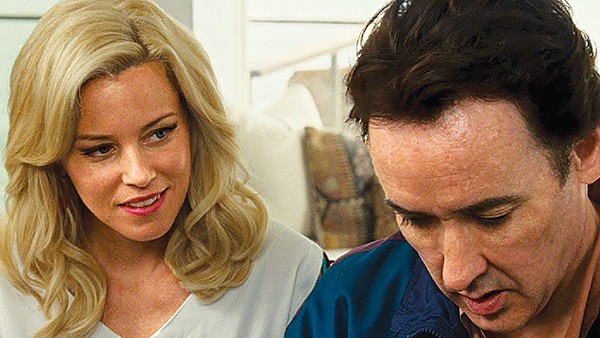Brian Wilson’s rise to the heights of musical genius and subsequent fall into the depths of psychosis has been ripe for a biopic for years. The transatlantic rivalry between the Beatles and the Beach Boys that pushed both bands into new creative territory is one of rock music’s greatest myths. The Fab Four’s 1965 record Rubber Soul inspired Wilson to push his studio work further with 1966’s Pet Sounds, which in turn inspired the Beatles to rip up the rule book for 1967’s Sgt. Pepper’s Lonely Hearts Club Band. Wilson’s rejoinder was to have been an album called Smile that, Beach Boys partisans claim, would have been the greatest rock album of all time. But Wilson had a nervous breakdown in the middle of the Smile recording sessions and the rest of the band, led by Mike Love, wrested musical control away from him, ceding the field to the Liverpudlians and dooming the American band to decades of formulaic surf nostalgia.
Director Bill Pohlad’s Love & Mercy gives myth the film treatment it deserves, not by creating an epic clash of musical titans, but by concentrating on Brian Wilson’s point of view. Pohlad is a veteran producer whose filmography includes Brokeback Mountain, The Tree of Life, and 12 Years a Slave, so he understood that the relatively small-scale and built-in audience allowed him to take creative chances. His experiments pay off handsomely. The film shuttles back and forth between the mid 1960s and the 1980s with two different actors playing Wilson in different periods of his life. Young Brian is Paul Dano, who portrays Wilson with wide eyes and an open mind but with a stinging emotional vulnerability. Old Brian is played by John Cusack, who is as foggy and frightened as Dano is clear and focused. Using multiple actors to play a famous figure has been tried before, most notably when Todd Haynes used six actors to play Bob Dylan in I’m Not There. But here the move feels completely appropriate. Wilson has said he looks back at the time before his breakdown and can’t recognize the person he used to be.

Elizabeth Banks and John Cusack
The 1960s segments tell the story of the creation of Pet Sounds, the recording of “Good Vibrations,” and the disastrous Smile sessions. Dano is brilliant as he fights off questions from his band, including Kenny Wormald as long-suffering Dennis Wilson and Jake Abel as the ambitious Mike Love. The high point of his performance is when he sings a sweet, aching version of “God Only Knows.” But his confidence melts when confronted with his manipulative, abusive father Murry Wilson (Bill Camp).
In the 1980s, we meet Cusack’s broken, scattered, middle-aged Brian as he haltingly reaches out to Melinda Ledbetter (Elizabeth Banks), a glammy, Southern California Cadillac saleswoman who acts as the audience’s way into Brian’s cloistered world. Oren Moverman and Michael Lerner’s script expertly dribbles out disturbing details of the reclusive rock star lorded over by his psychiatrist, Dr. Eugene Landy, played with gleeful evil by Paul Giamatti. Cusack, who has long been trapped in his own movie star persona, digs deep into this role, nailing Wilson’s shuffling walk and his pained expressions when he tries to play piano as well as he used to. Cusack gets some of the best lines in the film, like when Brian, explaining the creative process to Melinda, says, “Every once in a while, once in a blue moon, your soul comes out to play.”
Cinematographer Robert D. Yeoman, a frequent Wes Anderson collaborator, shoots Southern California as both beautiful and alienating, as appropriate to the story. But director Pohlad’s secret weapon is his incredible sound design team, led by Eugene Gearty, who mixes snippets of Beach Boys songs with swirling, ambient sounds to reflect Wilson’s inner state. In an age where directors are content to use the unprecedented technology available in modern movie theaters just to make subwoofer “whomp” noises to telegraph dramatic moments, Pohlad and Gearty create a subtle, complex soundscape worthy of a film about a sonic genius. With a substantive story, a passionate cast and crew, and an experimental eye and ear, Pohlad has crafted one of the best movies of the year.